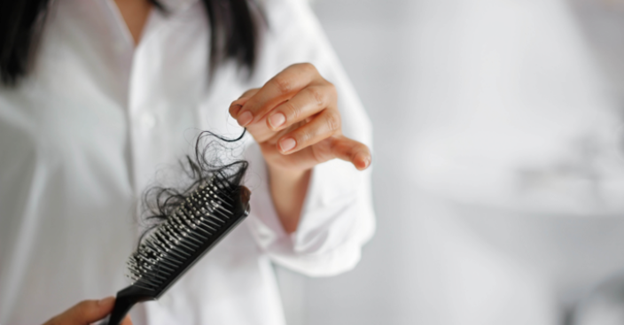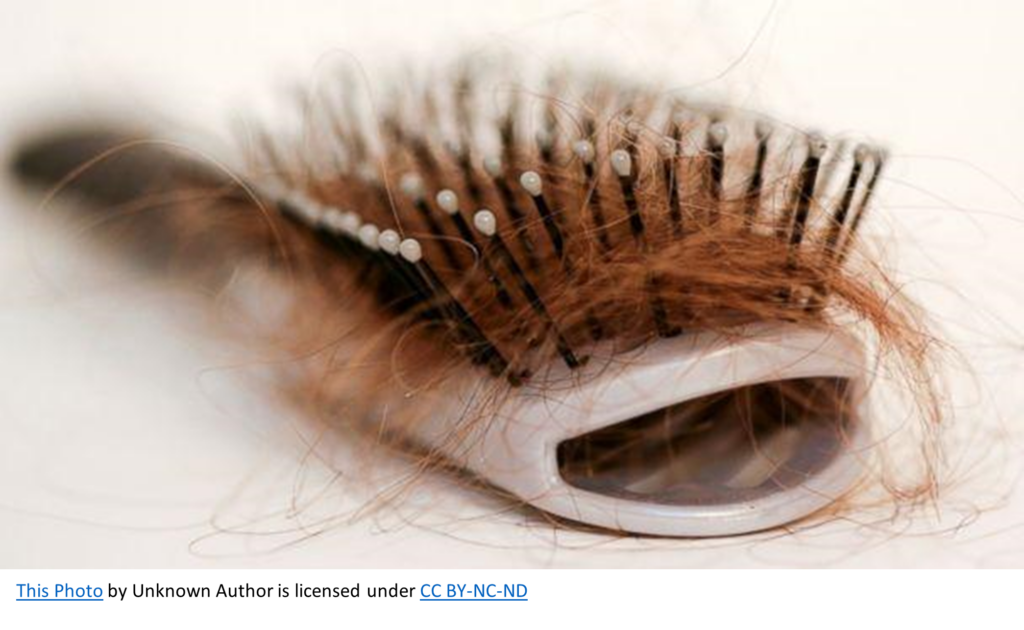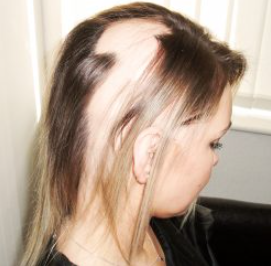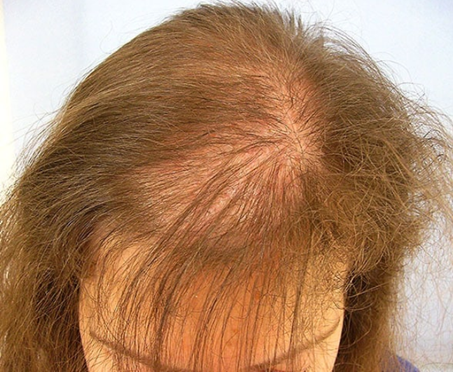
Understanding the Root Cause of Hair Loss
Hair loss is a common but devastating problem to deal with. It’s not just effecting you physically. Hair loss creates effects your mood, self-esteem, attractiveness, and identity. It’s not as simple as taking Rogaine, biotin containing supplements, or an expensive shampoo. There are many different causes of hair loss, and we need look at each person as an individual and look for their underlying root cause of why they are losing hair. Luckily, most types of hair loss can be addressed through functional medicine and a whole-body approach to health.
Hair loss is thought to be more common in men, but according to the American Hair Loss Association, women actually make up 40% of American hair loss sufferers. 1 Hair loss, scientifically called alopecia, is a symptom of an imbalance in the body. Those imbalances can be immune related, stress related, nutritional deficiencies, a trigger of genetics, medications, or something else causing inflammation in the body. When hair loss occurs due to a short-term event it can grow back given the right circumstances. Unfortunately, hair loss can be a life-long struggle with certain genetics, or when you don’t understand and aren’t able to address the root cause.

Different types of hair loss
Male pattern baldness
Male pattern baldness is common among men and, unfortunately, harder to deal with as it’s often triggered by genetics or male hormones. Male pattern baldness is characterized mainly by a receding hairline and often with a loss of hair at the crown of the head. This type of hair loss is called androgenetic alopecia (andro meaning male hormone, and genetic meaning it’s just in your family – sorry!) Androgenetic alopecia accounts for 95% of hair loss in men. By the time men are in their mid-thirties, two-thirds of them will likely experience some degree of hair loss.1 Our hair follicles are impacted by our hormones and the androgens testosterone (and DHT) and DHEA trigger hair loss in those with the gene for androgenic alopecia.
Autoimmune related hair loss
Losing hair in patches, where it falls out in clumps, often leaving the scalp or other body part hairless and really smooth is different. If you have a lost hair in patches, it could be a sign of an autoimmune condition. When you have an autoimmune condition, your own immune system mistakenly attacks your own body. The autoimmune condition where your body attacks the hair follicles is alopecia areata. Other autoimmune conditions can also cause hair loss including Lupus, Hashimoto’s thyroiditis, Graves disease, psoriasis, Crohn’s disease or inflammatory bowel disease. If you are suffering from an autoimmune disease then there is a whole cascade of systems to look into including the microbiome, intestinal permeability, exposure to certain toxins and chemicals from the environment, genetic predisposition, and stressful triggers.

Diffuse hair loss
Diffuse hair loss typically is seen as a widening of your natural part or an overall thinning. Hair breakage or loss in hair quality is also something to look for. This type of hair loss can be effected by child birth, nutritional status, surgeries or medical interventions like chemotherapy, extreme stress or other factors.
If your hair has lost its luster and is thinning and you also notice that the outer portion of your eyebrows is thinning or is gone, then this can be an indication of a thyroid imbalance.

The most common reason that women have hair loss is hormonally related and often we see it when one develops polycystic ovarian syndrome (PCOS) and/or insulin resistance. When estrogen and progesterone shift due to PCOS or insulin resistance it causes women to have higher levels of testosterone and DHEA than they normally would. This shows up as a receding hairline, thinning of hair overall, male pattern balding on the crown of the head, and more hair growing on their chin for example (hirsutism). PCOS is identified as menstrual changes, infertility, pelvic pain, fatigue, depression/anxiety, acne, insomnia, and headaches. About half of the people with PCOS will have weight gain and obesity that is difficult to manage.4 Most of this weight is abdominal fat and those with PCOS often have a larger high waist to hip ratio (an apple as oppose to a pear shape).
Drug Induced Hair Loss
Many commonly prescribed prescription drugs can cause temporary hair loss, trigger the onset of male and female pattern baldness, and even cause permanent hair loss.1 All drugs derived from vitamin A as treatments for acne or other conditions, amphetamines, anti-fungal, Beta-blockers used to treat high blood pressure, some blood thinners, some cholesterol lowering drugs, anti-depressants, birth control pills, drugs to tread thyroid disorders and more. The American Hair Loss Association has a good list on their site.
Understanding the big picture
Typical treatments include steroid injections, medicines like Rogaine, testosterone blockers, laser treatments, or follicle transplants. Often doctors have little success with treatments if the cause is genetic, autoimmune, PCOS, or thyroid related or due to stress.
The holistic approach is to understand the big picture and hopefully identify the root cause. To do that you need to think about your history, diet, and inflammatory co-factors.
Needed information includes:
- Timeline – when did this start how long is it been going on?
- What kind of patterns have you seen – what else is going on in the body?
- What is your diet like? We need to look at your overall nutritional status as well as the intake of specific nutrients such as protein, healthy fats, biotin and pantothenic acid, vitamin D, B12 or iron.
- How are you digesting and absorbing foods? Do you have leaky gut, Celiac disease, or IBS? Any condition that can all decrease your ability to absorb the nutrients you need for growing hair can be a factor.
- Intake of inflammatory food like gluten can be a factor especially when someone has Hashimoto’s, PCOS, or another autoimmune disease.
- Menstrual cycle patterns, fertility issues, menopause symptoms?
- Hormonal and thyroid imbalances can be determined through lab data. The following are important to ask your doctor about if you are suffering from hair loss.
- Full thyroid panel (see Feeling Awful with a “Normal” TSH)
- Fasting insulin, fasting glucose, A1c
- Cortisol, DHEA, testosterone, LH, FSH
- Full iron panel
Wholistic Health
Diet can be a major factor in hair loss. It’s important to eat a diet rich in whole unprocessed vegetables with healthy portions of protein and fat. Regulating the hormones, both thyroid, and insulin is also extremely important. High levels of insulin occur when we are stressed, inflamed, and eating the wrong food. Inflammation can be caused by processed high-carbohydrate and high-sugar foods, toxins like plastics BPA and/or BPS, foods sprayed with pesticides, or anything that creates changes to the microbiome. Inflammation is also caused by emotional and mental stress, lack of sleep, large waist to hip ratio, insulin sensitivity, a sedentary lifestyle and more.
Lifestyle changes that address your diet, sleep, stress, movement, and overall health can improve your hair growth. If you need help looking into your root cause or with your diet reach out to me.
Resources:
- https://www.americanhairloss.org/
- Getting To The Root of Male and Female Hair loss – Mark Hyman & Elizabeth Bohem, Nov 16th 2020
- Best Natural Hair Loss Remedies – Dr. Josh Axe
- https://www.pcosaa.org/pcos-symptoms/
Erin Williams, MSN CN LMP, is the founder of EZBalance.com, a health and wellness company established in 2001. Erin has a bachelor’s degree in Chemistry from Purdue, a master’s degree in Nutrition from Bastyr University, and is currently studying to become a Functional Medicine Practitioner. Erin enjoys sharing her love of natural health and wellness with people through lectures, blogs, and consultations.

